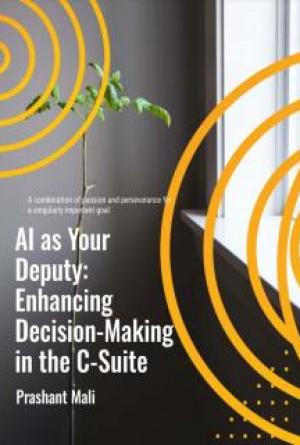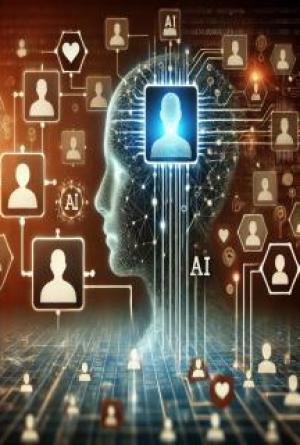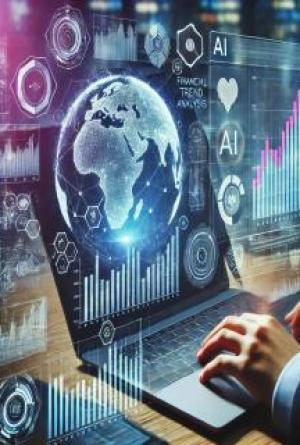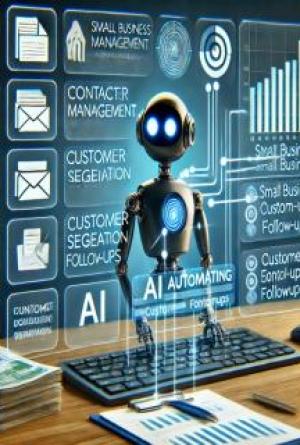CHAPTER 7: Future of Artificial Intelligence
The future of artificial intel igence (AI) holds immense potential and presents significant opportunities for transforming various industries, including healthcare, finance, transportation, and education. The rapid advancement of AI technology has already led to the development of innovative solutions such as autonomous vehicles, personalized medicine, and virtual assistants. In the future, AI is likely to play an even more prominent role in society, with the emergence of new applications such as smart cities, predictive analytics, and human-robot col aboration. However, the development of AI also raises ethical, social, and economic concerns, including the displacement of human workers, biases in decision-making algorithms, and the potential misuse of AI for malicious purposes. As AI continues to evolve, it wil be critical to strike a balance between harnessing its potential and addressing these challenges, ensuring that AI is deployed in a responsible and ethical manner that benefits all of society.
7.1 Current Trends in AI
Artificial Intel igence (AI) has come a long way since its inception in the 1950s. With the advent of deep learning, AI has become more advanced and can now perform tasks that were previously thought to be impossible. AI is being used in a variety of applications, from natural language processing to computer vision, and is transforming the way we live and work. In this article, we wil discuss the current trends in AI and their impact on different industries.
Natural Language Processing (NLP): NLP is the branch of AI that deals with the interaction between humans and computers using natural language. The current trend in NLP is to create chatbots that can have natural conversations with humans. Chatbots are being used in customer service and e-commerce to provide assistance to customers.
Computer Vision: Computer vision is the field of AI that deals with how machines can interpret and understand visual information from the world. Current trends in computer vision include facial recognition, object detection, and image classification. Computer vision is being used in autonomous vehicles, security systems, and medical imaging.
Robotics: Robotics is the field of AI that deals with the design, construction, and operation of robots. Current trends in robotics include col aborative robots (cobots), which work alongside humans in manufacturing and assembly lines, and drones, which are being used for delivery and surveil ance.
Machine Learning: Machine learning is a subfield of AI that focuses on the development of algorithms that enable machines to learn from data. The current trend in machine learning is deep learning, which is a type of machine learning that uses artificial neural networks to analyze large amounts of data. Deep learning is being used in image recognition, natural language processing, and self-driving cars.
Autonomous Systems: Autonomous systems are machines that can operate without human intervention. The current trend in autonomous systems is the development of autonomous vehicles, such as self-driving cars and trucks. Autonomous vehicles have the potential to 2023 - THE BEGINNER’S GUIDE TO ARTIFICIAL INTELLIGENCE (AI) – Frank A Dartey (AIWeblog.com) 49



THE BEGINNER’S GUIDE TO ARTIFICIAL INTELLIGENCE (AI) – Frank A Dartey (AIWeblog.com) 50
revolutionize the transportation industry and reduce the number of accidents caused by human error.
Big Data: Big data is a term used to describe the large amount of data that is generated by businesses, governments, and individuals. The current trend in big data is the use of AI to analyze and make sense of the data. AI algorithms can analyze large datasets to identify patterns and trends that are not visible to the human eye.
Healthcare: AI is being used in healthcare to improve patient outcomes and reduce healthcare costs. Current trends in healthcare AI include medical image analysis, drug discovery, and personalized medicine. AI is being used to analyze medical images to diagnose diseases and develop new drugs that are more effective and have fewer side effects.
Cybersecurity: AI is being used in cybersecurity to identify and prevent cyber attacks.
Current trends in cybersecurity AI include anomaly detection, threat intel igence, and predictive analytics. AI algorithms can analyze network traffic to identify anomalies that may indicate a cyber attack.
Education: AI is being used in education to improve learning outcomes and personalize learning experiences for students. Current trends in education AI include adaptive learning, intel igent tutoring systems, and chatbots that provide assistance to students.
Gaming: AI is being used in gaming to create more realistic and challenging opponents for players. Current trends in gaming AI include procedural generation, reinforcement learning, and adversarial networks. AI algorithms can learn from player behavior to create more challenging opponents.
Agriculture: AI is being used in agriculture to improve crop yields and reduce the use of pesticides. Current trends in agricultural AI include precision agriculture, crop monitoring, and soil analysis. AI algorithms can analyze data from sensors and drones to identify areas where crops are not growing wel and recommend actions to improve yields.
Finance: AI is being used in finance to improve investment decisions and detect fraud.
Current trends in finance AI include algorithm
7.2 Predictions for the Future of AI
Artificial intel igence (AI) has rapidly transformed into a field of intense research and development in the last few decades. AI, which refers to the ability of machines to learn from data and perform tasks that typically require human intel igence, has already had a profound impact on many areas of our lives, including healthcare, education, transportation, and entertainment. As the pace of technological progress continues to accelerate, there is no doubt that AI wil continue to evolve and shape our future in countless ways. In this article, we wil explore some predictions for the future of AI.
AI wil continue to advance at a breakneck pace. We have already witnessed dramatic advancements in AI, and this trend is likely to continue. The development of AI is largely 2023 - THE BEGINNER’S GUIDE TO ARTIFICIAL INTELLIGENCE (AI) – Frank A Dartey (AIWeblog.com) 50



THE BEGINNER’S GUIDE TO ARTIFICIAL INTELLIGENCE (AI) – Frank A Dartey (AIWeblog.com) 51
driven by improvements in computer hardware and software, as wel as the availability of large amounts of data. As these factors continue to improve, AI systems wil become even more powerful and capable.
AI wil become more ubiquitous. AI is already present in many aspects of our daily lives, from virtual assistants like Siri and Alexa to recommendation algorithms on e-commerce websites. As AI technology continues to advance and become more affordable, we can expect it to become even more widespread.
AI wil become more human-like. One of the ultimate goals of AI research is to create machines that can think and reason like humans. While this goal is stil far off, there have already been significant strides in this direction. In the future, we can expect AI systems to become even more human-like in their behavior and decision-making.
AI wil revolutionize healthcare. AI has the potential to dramatically improve healthcare by enabling earlier and more accurate diagnoses, more personalized treatments, and more efficient delivery of care. AI-powered medical devices and diagnostic tools are already in use today, and we can expect this trend to accelerate in the coming years.
AI wil transform transportation. Self-driving cars and trucks are already on the roads, and they are likely to become even more common in the future. AI-powered transportation systems wil be able to optimize routes, reduce traffic congestion, and improve safety.
AI wil change the nature of work. As AI systems become more advanced, they wil be able to perform many tasks that are currently performed by humans. This wil have a profound impact on the nature of work, and wil likely result in significant changes to the job market.
AI wil create new industries and jobs. While some jobs may be replaced by AI, the development of new AI-powered industries and jobs is also likely. For example, there wil be a need for people to design, build, and maintain AI systems, as wel as for people to analyze and interpret the data generated by these systems.
AI wil improve education. AI has the potential to transform education by providing personalized learning experiences, improving student engagement, and automating administrative tasks. AI-powered educational tools are already in use, and we can expect this trend to continue.
AI wil enhance entertainment. AI is already being used to create more immersive and interactive entertainment experiences, such as virtual reality and augmented reality. In the future, AI-powered entertainment wil become even more sophisticated and engaging.
AI wil become more ethical and transparent. As AI systems become more powerful and influential, there wil be a greater need for ethical considerations and transparency. AI systems must be designed and deployed in a way that is fair, unbiased, and respectful of individual privacy.
2023 - THE BEGINNER’S GUIDE TO ARTIFICIAL INTELLIGENCE (AI) – Frank A Dartey (AIWeblog.com) 51



THE BEGINNER’S GUIDE TO ARTIFICIAL INTELLIGENCE (AI) – Frank A Dartey (AIWeblog.com) 52
AI wil have a profound impact on society. The impact of AI on society is likely to be profound and far-reaching. AI has the potential to transform the way we live, work, and interact with each other. It is essential that we careful y consider the implications of AI and take steps to ensure that its development and use are guided by ethical considerations and a commitment to social responsibility.
7.3 Opportunities and Challenges in AI
Artificial Intel igence (AI) has transformed the way we live, work and interact with technology. The rapid advancement in AI has opened up new opportunities for businesses and individuals, as wel as new challenges that need to be addressed. In this article, we wil explore the opportunities and challenges of AI in detail.
Opportunities:
Increased efficiency: AI has the ability to automate repetitive tasks, which can help increase efficiency in various industries. This can free up human resources to focus on more complex tasks and improve productivity.
Improved decision-making: AI algorithms can analyze large amounts of data and identify patterns, allowing for better decision-making. This can help businesses identify new opportunities, streamline operations, and make more informed decisions.
Personalization: AI can help businesses personalize their products and services to meet the specific needs of individual customers. This can help increase customer satisfaction and loyalty, as wel as drive sales.
Enhanced customer experience: AI-powered chatbots and virtual assistants can help improve customer experience by providing round-the-clock support, answering customer queries, and resolving issues in real-time.
New business models: AI has the potential to create new business models and revenue streams, such as predictive maintenance, autonomous vehicles, and personalized healthcare.
Better healthcare: AI can be used to analyze medical data and develop personalized treatment plans for patients, as wel as to develop new drugs and treatments for diseases.
Improved safety: AI-powered systems can help improve safety in various industries, such as manufacturing and transportation, by identifying potential risks and taking corrective action in real-time.
Cost savings: AI can help reduce costs by automating tasks and optimizing processes, which can lead to higher profits for businesses and lower prices for consumers.
Increased accuracy: AI algorithms can analyze data more accurately than humans, reducing the risk of errors and improving the quality of results.
2023 - THE BEGINNER’S GUIDE TO ARTIFICIAL INTELLIGENCE (AI) – Frank A Dartey (AIWeblog.com) 52



THE BEGINNER’S GUIDE TO ARTIFICIAL INTELLIGENCE (AI) – Frank A Dartey (AIWeblog.com) 53
Improved security: AI can help identify potential security threats and vulnerabilities, as wel as prevent cyberattacks and data breaches.
Challenges:
Ethical concerns: As AI becomes more powerful, ethical concerns have arisen regarding its use. Issues such as privacy, bias, and discrimination need to be addressed to ensure that AI is used in an ethical and responsible manner.
Lack of transparency: AI algorithms can be complex and difficult to understand, making it difficult to determine how they arrive at certain decisions. This lack of transparency can lead to mistrust and confusion among users.
Data bias: AI algorithms are only as good as the data they are trained on, and if the data is biased, the algorithm wil be too. This can lead to unfair or discriminatory outcomes, particularly in areas such as hiring and lending.
Unemployment: As AI automates more tasks, there is a risk that it wil lead to job losses, particularly in industries such as manufacturing and transportation.
Regulation: The rapid advancement of AI has outpaced regulation, which can make it difficult to ensure that AI is used in a responsible and ethical manner.
Complexity: AI algorithms can be complex and require significant computing power and expertise to develop and maintain. This can make it difficult for smaller businesses and individuals to take advantage of AI.
Security: As AI becomes more ubiquitous, the risk of cyberattacks and data breaches increases. This can lead to significant financial losses and damage to reputation.
Overreliance: There is a risk that people may become too reliant on AI, leading to a loss of critical thinking and decision-making skil s.
Lack of diversity: The development of AI is dominated by a narrow group of individuals and companies, which can lead to a lack of diversity and a lack of consideration for different perspectives and needs.
Misuse: AI has the potential to be used for malicious purposes, such as developing autonomous weapons or spreading fake news. This misuse can have significant negative consequences for society as a whole.
Interpretation errors: AI algorithms can make mistakes, particularly when presented with new or unusual situations. This can lead to incorrect decisions and negative outcomes, particularly in areas such as healthcare or autonomous vehicles.
2023 - THE BEGINNER’S GUIDE TO ARTIFICIAL INTELLIGENCE (AI) – Frank A Dartey (AIWeblog.com) 53



THE BEGINNER’S GUIDE TO ARTIFICIAL INTELLIGENCE (AI) – Frank A Dartey (AIWeblog.com) 54
Regulatory compliance: As AI is increasingly used in regulated industries, such as finance and healthcare, there is a need to ensure that it complies with regulatory requirements and standards.
Inadequate infrastructure: The development and deployment of AI require significant computing power and infrastructure, which can be a barrier to entry for smaller businesses and organizations.
Data privacy: The use of AI often requires the colection and analysis of large amounts of personal data, which can raise privacy concerns and lead to potential breaches of confidentiality.
Long-term impact: The long-term impact of AI on society is stil unclear, and there is a need to careful y consider the potential consequences of its widespread adoption.
In conclusion, while the opportunities presented by AI are vast, there are also significant challenges that need to be addressed. These challenges include ethical concerns, data bias, unemployment, lack of transparency, and regulatory compliance. It is essential that these challenges are addressed in a responsible and ethical manner to ensure that AI is used to benefit society as a whole. This can be achieved through a combination of education, regulation, and col aboration between businesses, governments, and individuals. By doing so, we can harness the power of AI to create a more efficient, personalized, and safer world.
2023 - THE BEGINNER’S GUIDE TO ARTIFICIAL INTELLIGENCE (AI) – Frank A Dartey (AIWeblog.com) 54



THE BEGINNER’S GUIDE TO ARTIFICIAL INTELLIGENCE (AI) – Frank A Dartey (AIWeblog.com) 55
CHAPTER 8: Resources for Further Learning.
Artificial Intel igence (AI) is a rapidly evolving field, and it is important for individuals to stay up-to-date with the latest developments and trends. Fortunately, there are numerous resources available for those interested in furthering their education in AI. In this article, we wil explore some of the best resources for learning more about AI.
First and foremost, online courses are a great way to learn about AI. Platforms like Coursera, edX, and Udemy offer a wide range of courses on AI, ranging from introductory courses to advanced ones. These courses cover topics such as machine learning, deep learning, natural language processing, computer vision, and robotics. Most of these courses are taught by industry experts and professors, and they are typically self-paced, which means learners can work at their own speed.
Another great resource for learning about AI is online communities. Platforms like Reddit, Quora, and Stack Overflow have dedicated communities for AI enthusiasts, where they can ask questions, discuss trends, and share their experiences. LinkedIn is another great platform where professionals in the field share their knowledge and insights. Additionally, there are several online forums and groups that are dedicated to AI and related topics, where learners can engage with like-minded individuals.
Books are also a valuable resource for learning about AI. There are numerous books available that cover the basics of AI, machine learning, and other related topics. Some of the most popular books include “Artificial Intel igence: A Modern Approach” by Stuart Russel and Peter Norvig, “Deep Learning” by Ian Goodfel ow, Yoshua Bengio, and Aaron Courvil e, and “Machine Learning Yearning” by Andrew Ng. These books are written by industry experts and provide a comprehensive overview of AI and its applications.
Conferences and meetups are another great resource for learning about AI. Many conferences, such as the Conference on Neural Information Processing Systems (NeurIPS) and the International Conference on Machine Learning (ICML), are held annually and attract AI researchers and practitioners from around the world. Additionally, there are several AI-related meetups that take place in various cities around the world, where learners can network with professionals in the field and learn about the latest trends and developments.
Online tutorials and blogs are also a great resource for learning about AI. Many AI researchers and practitioners share their knowledge and expertise through tutorials and blogs. Websites like Medium, KDnuggets, and Towards Data Science have a wealth of information on AI and related topics. Additionally, YouTube is another great resource for learning about AI, with numerous channels dedicated to AI education, such as Two Minute Papers, Siraj Raval, and Andrew Ng.
Finally, MOOCs (Massive Open Online Courses) are another great resource for learning about AI. These courses are typically free and cover a wide range of topics related to AI, including machine learning, deep learning, natural language processing, and computer vision. Some of the most popular MOOC platforms include Coursera, edX, and Udacity.
2023 - THE BEGINNER’S GUIDE TO ARTIFICIAL INTELLIGENCE (AI) – Frank A Dartey (AIWeblog.com) 55




THE BEGINNER’S GUIDE TO ARTIFICIAL INTELLIGENCE (AI) – Frank A Dartey (AIWeblog.com) 56
MOOCs are a great way to learn about AI for those who cannot attend traditional classes due to time or location constraints.
In conclusion, there are numerous resources available for those interested in learning more about AI. Online courses, online communities, books, conferences and meetups, online tutorials and blogs, and MOOCs are just a few examples of the many resources available. It is important for individuals to stay up-to-date with the latest developments and trends in AI, as it is a rapidly evolving field that has the potential to transform various industries. By taking advantage of these resources, learners can gain the knowledge and skil s needed to succeed in the field of AI.
2023 - THE BEGINNER’S GUIDE TO ARTIFICIAL INTELLIGENCE (AI) – Frank A Dartey (AIWeblog.com) 56



THE BEGINNER’S GUIDE TO ARTIFICIAL INTELLIGENCE (AI) – Frank A Dartey (AIWeblog.com) 57
2023 - THE BEGINNER’S GUIDE TO ARTIFICIAL INTELLIGENCE (AI) – Frank A Dartey (AIWeblog.com) 57
soprotection.com
































